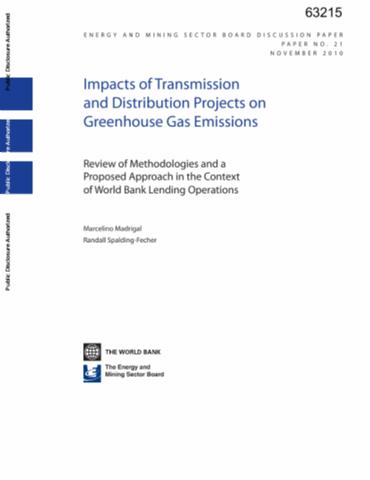Resource information
The Strategic Framework for Development and Climate Change (SFDCC) approved in 2008 guides and supports the operational response of the World Bank Group (WBG) to new development challenges posed by climate change. One activity pursued by the SFDCC is to further develop and test methods to analyze climate risks and greenhouse gas (GHG) emissions at the project level. The SFDCC emphasizes the need to improve GHG accounting activities at the project level to understand the implications of the World Bank's interventions. The objective of this study is to contribute to the SFDCC goal of improving GHG accounting in the energy sector by reviewing, assessing, and recommending GHG accounting methodologies for electricity Transmission and Distribution (T&D) projects. Existing methodologies are examined to test whether they can provide simple and accurate estimates of net project emissions. In addition, the study identifies and conceptually designs a methodological approach for T&D projects. The study focuses on the T&D sector due to its importance in the World Bank's energy lending portfolio and the lack of comprehensive methodologies to determine the impact of such interventions on GHG emissions. The study builds on existing information and relies on methodologies developed under different climate finance mechanisms such as the Clean Development Mechanism (CDM). The study also considers some of the fundamental principles in other accounting procedures, such as corporate GHG accounting. Methodologies that have the objective of emissions accounting for climate finance mechanisms need to have specific characteristics, such as additionality and ex post monitoring. These methodologies must calculate a project's emissions reductions or increases by estimating the project's net emissions impact.


